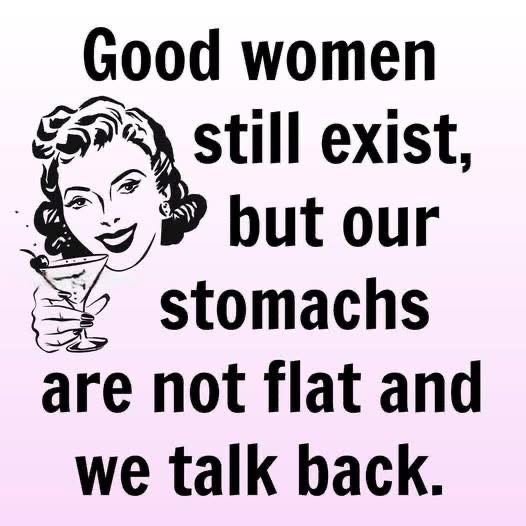
In a world obsessed with physical perfection and passive behavior, a simple yet powerful quote is circulating online:
“Good women still exist, but our stomachs are not flat and we talk back.”
This isn’t just a cheeky meme to scroll past — it’s a statement, a movement, and a mirror held up to a society that too often demands perfection and silence from women. At its core, this quote is about empowerment, self-acceptance, and breaking free from outdated expectations. Let’s unpack the deeper meaning behind these words and why they resonate with so many women today.
🌟 The Myth of the “Perfect Woman”
Historically and culturally, the concept of a “good woman” has often been tied to a narrow checklist:
- Physically attractive, usually defined by unrealistic beauty standards.
- Quiet, submissive, agreeable.
- Caring, self-sacrificing, and emotionally restrained.
- Always poised, always polite, and — perhaps most troubling — always pleasing to others.
These ideals have been reinforced by media, tradition, and even social expectations passed down through generations. Women are often taught to be accommodating, to shrink themselves both physically and emotionally, and to always put others first. The image of the “perfect” woman has long been thin, quiet, and compliant.
But times have changed — and so have women.
💬 “Our Stomachs Are Not Flat…”
This part of the quote takes a direct jab at unrealistic body standards.
For decades, women have been bombarded with messages telling them that their worth is directly tied to their appearance — especially their weight. Advertisements, celebrities, magazines, and now social media influencers have pushed the idea that a flat stomach is a symbol of discipline, beauty, and even morality.
But here’s the truth: bodies come in all shapes and sizes. Flat stomachs don’t define goodness, health, intelligence, or value. They are simply a feature — and not one everyone has or should be expected to have.
Women are learning to embrace their natural bodies: soft stomachs, stretch marks, curves, muscles, scars, and everything in between. This is not laziness or “letting go.” This is freedom. It’s a rebellion against the exhausting pressure to conform to someone else’s idea of beauty.
💬 “…And We Talk Back”
This might be the most powerful part of the quote. “We talk back” is not just about being vocal — it’s about reclaiming agency.
For far too long, women were discouraged — even punished — for speaking up:
- Speaking up against injustice.
- Standing up for themselves in relationships or the workplace.
- Calling out toxic behavior.
- Asking for more. Demanding better.
“Talking back” is no longer seen as rude or disrespectful. It is a form of resistance. It is the voice of a woman who knows her worth and refuses to be silenced. Whether it’s confronting a sexist comment, negotiating a raise, or rejecting societal pressures, “talking back” is the new norm for empowered women.
And guess what? That doesn’t make a woman difficult. It makes her brave.
💖 Redefining What It Means to Be a “Good Woman”
This quote flips the script on outdated notions of goodness. It reclaims the label of “good woman” for those who:
- Set boundaries unapologetically.
- Love their bodies, even if they don’t fit the mold.
- Speak their truth — even when it’s uncomfortable.
- Value authenticity over approval.
- Support other women instead of competing with them.
Being a “good woman” is no longer about perfection. It’s about integrity, strength, vulnerability, and courage.
🌍 A Cultural Shift
This isn’t just about individuals — it’s a global cultural shift. Women everywhere are rewriting the rules of womanhood. From body positivity movements to feminist activism, women are standing tall, proud, and vocal.
The result? A more inclusive world where “goodness” isn’t defined by appearance or docility, but by character.
📢 Final Thoughts: We’re Still Here
So yes — good women still exist.
We’re just not living to please. We’re not starving ourselves to fit a mold. We’re not staying silent to keep the peace.
We’re real.
We’re human.
We have curves, opinions, and the courage to speak them.
And if that makes some people uncomfortable?
Well… we’ll probably talk back.